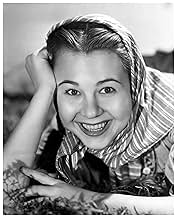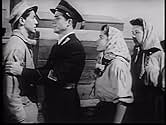Ajouter une intrigue dans votre langueA Ukrainian village must suddenly contend with the German invasion of June 1941.A Ukrainian village must suddenly contend with the German invasion of June 1941.A Ukrainian village must suddenly contend with the German invasion of June 1941.
- Réalisation
- Scénario
- Casting principal
- Nommé pour 6 Oscars
- 6 victoires et 6 nominations au total
Avis à la une
Reading the posts on the movie here, it appears to me that some commentators really miss the whole point of US propaganda at the time and condemn The North Star out of context. These responses suggest to me that The North Star's punch has lost none of its original power.
Other posters to this site have commented on the folk-peasant musicale that dominates the first half-hour of the film, so I'll dispense mention of it here. Suffice it to say, however, that from the first scene of violence -- a merciless daytime bombardment of civilians on a quiet Ukrainian country road -- the film gathers emotional strength. And when Anne Baxter, playing a schoolgirl, gazes for the first time upon the horrific vision of her school chums, now dead as the result of mechanized warfare, she states evenly, "We're not young anymore." She and a few others escape into the forest, emerging now and then to engage in hit-and-run sabotage against the Nazi aggressors. The film builds to a climax in which Russian partisans astride horses attempt to take back their village from the better- equipped Germans, giving director Milestone an opportunity to reprise the long tracking shots of approaching figures that became his trademark visual motif.
When Samuel Goldwyn produced "The North Star," he pulled out all the stops. He enlisted James Wong Howe to photograph, William Cameron Menzies to design the production, and Aaron Copland to write the background score. The cast, besides Baxter, includes Dana Andrews, Farley Granger, Walter Huston, and, as the Nazi You Love to Hate, the legendary Erich Von Stroheim, as a German military doctor who compromises his professional oath through medical experimentation. Supplies of blood for the German wounded have dried up, so Dr. Von Stroheim orders the village children rounded up and brought to the local school, where he draws great quantities of blood from them -- so much so, that a few kids die from the process. Effective and highly dramatic, it certainly beats visions of the Hun boiling Belgian babies in oil.
I have finally seen this film to the end! Not bad after 68 years. I now realise why it made such an impression on me. In the film, the children and some adults were bombed and machine gunned by aircraft, after jumping from the carts into a ditch. It was at this point that we had to leave the cinema because of an air raid, having just seen children killed on the screen. I had already experienced many air raids at the age of 3 years and 9 months, during the Septmber 1940 Blitz and I still have vivid memories of the bombing, destruction and fires. Am I correct, or is my memory failing in that I believe the original title for the U.K release was 'The Red Star'???
The first part of the story simply dwells on the daily lives of the residents of a Ukrainian farm town. This part is quite slow, and would be of little interest except for the sharp change of tone that comes with the Nazi attack. As banal as the lives of the villagers may have seemed, they certainly did nothing to deserve the suffering they bore as a result of the invasion. Things pick up dramatically in the second part, and at the same time the characters come more sharply into focus.
Naturally, the scenario is more fiction than fact, especially in its idyllic depiction of life under Stalin's rule. More than anything else, this reflects the urgent desire of the US Government (whose hand was supposedly quite active in the production) to promote full-fledged public support for working with the Soviet Union against the Axis. Like the majority of features in any era that address a then-contemporary issue, it looks much different when viewed years afterward. The truth about both Stalin and Hitler is much easier for us now to determine than it was for the movie's original viewers.
The cast helps considerably in making it work on a dramatic level. Experienced stars like Walter Huston and Walter Brennan combine with then-young performers like Anne Baxter, Farley Granger, and others to create a generally interesting set of characters. Jane Withers also has a good role, as a hapless but often endearing young woman who is desperate to help. Lillian Hellman brought her considerable reputation to the screenplay, although this kind of material is not really her strength. Lewis Milestone shows his steady hand in the battle sequences.
Because the cast, director, and writer all add their weight to the production, this works well enough as a fictional drama as long as you set aside what you thought or think about the USSR. As history, the story is not reliable, but the movie itself is interesting as one of the more earnest attempts of its day to use cinema to influence public opinion.
It might correctly be labeled a propaganda film as it was made during a time when we were engaged in WWII. Germany was our enemy and Russia was our ally. As the saying goes, "war makes strange bed fellows." The Nazi war machine is depicted as evil and Russians are shown as innocent victims. Both are indisputable facts. The purpose of the film may have been to propagandize just how evil we believed the Nazis to be but we see films like that all the time. One example, "Empire of the Sun" (1987), a very fine film by Steven Spielberg. That was also an evil empire. Its not considered propaganda now because the war is long over. Its "art." Some might consider "JFK" as a lot of propaganda. Oliver Stone considers it "art".
If one is interested in films of historical periods, such as WWII, this might certainly be a film of interest.
Le saviez-vous
- AnecdotesFilm debut of Farley Granger.
- GaffesWalter Brennan and Farley Granger ambush 3 German soldiers, as one is about to throw a grenade he drops it but it doesn't go off.
- Citations
Dr. von Harden: [while Dr. Kurin is holding a gun on Richter and von Harden] I do not like much of what I've done for the past nine years.
Dr. Pavel Grigorich Kurin: [after von Harden has given a blood transfusion from a Russian child to a German soldier] You do not like bleeding children?
Dr. von Harden: Did the boy die?
Dr. Pavel Grigorich Kurin: [Contemtuously] You knew he would die!
Dr. von Harden: They took too much blood. I'm sorry for that.
Dr. Pavel Grigorich Kurin: Yes, I nelieve you when you say you are sorry.
Dr. von Harden: I'm sorry for many things, Dr. Kurin. Most of all that this is not the world we used to know.
Dr. Pavel Grigorich Kurin: I've heard about you... civilized men who are sorry. This...
[Contemptuously gesturing toward Richter]
Dr. Pavel Grigorich Kurin: This kind is nothing! They will go when their bosses go, but men like you who have contempt for men like him! To me you are the real filth... men who do the work of Facists while they pretend to themselves that they are better than the beasts for whom they work... men who do murder while they laugh at them who order them to do it. It is men like you who have sold their people to men like him.
[He points to Richter and shoots him at point blank range]
Dr. Pavel Grigorich Kurin: You see, Dr. von Harden, you were wrong about many things. I AM a man who kills!
[He shoots von Harden at point blank range too]
- Versions alternativesIn 1956, the film was sold to television and re-edited under the title "Armored Attack." 25 minutes were removed, including all references to the word "comrade," and with the help of voice-over narrations, turned the alleged pro-Communist piece into anti-Communist territory.
- ConnexionsFeatured in Sprockets: Masters of Menace (1995)
Meilleurs choix
- How long is The North Star?Alimenté par Alexa
Détails
- Durée1 heure 48 minutes
- Couleur
- Rapport de forme
- 1.37 : 1





































